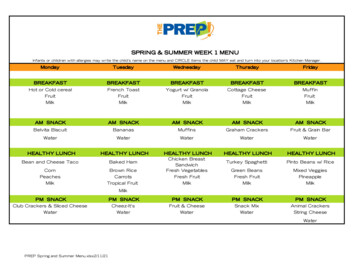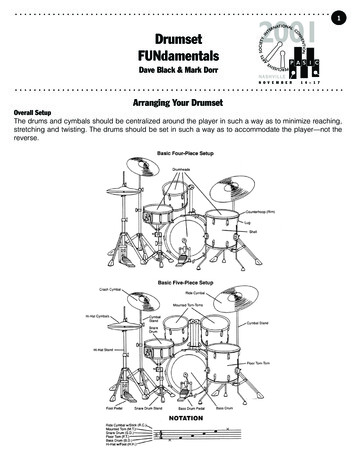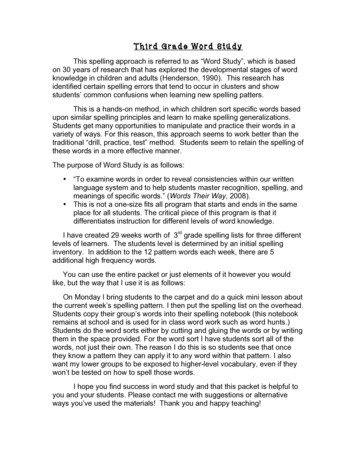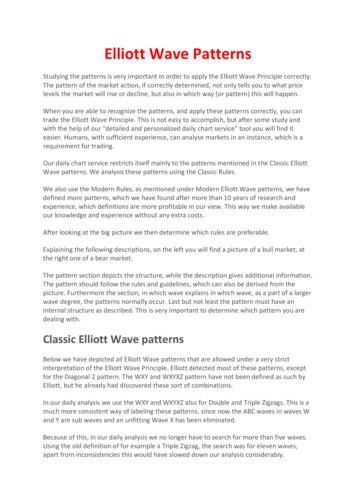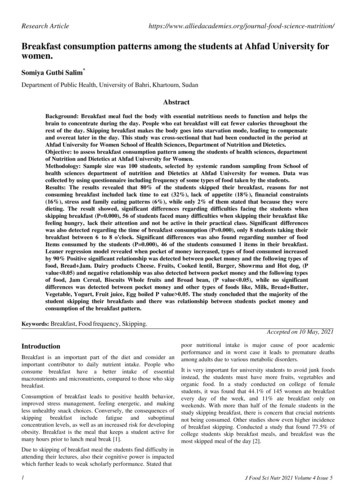
Transcription
Research d-science-nutrition/Breakfast consumption patterns among the students at Ahfad University forwomen.Somiya Gutbi Salim*Department of Public Health, University of Bahri, Khartoum, SudanAbstractBackground: Breakfast meal fuel the body with essential nutritious needs to function and helps thebrain to concentrate during the day. People who eat breakfast will eat fewer calories throughout therest of the day. Skipping breakfast makes the body goes into starvation mode, leading to compensateand overeat later in the day. This study was cross-sectional that had been conducted in the period atAhfad University for Women School of Health Sciences, Department of Nutrition and Dietetics.Objective: to assess breakfast consumption pattern among the students of health sciences, departmentof Nutrition and Dietetics at Ahfad University for Women.Methodology: Sample size was 100 students, selected by systemic random sampling from School ofhealth sciences department of nutrition and Dietetics at Ahfad University for women. Data wascollected by using questionnaire including frequency of some types of food taken by the students.Results: The results revealed that 80% of the students skipped their breakfast, reasons for notconsuming breakfast included lack time to eat (32%), lack of appetite (18%), financial constraints(16%), stress and family eating patterns (6%), while only 2% of them stated that because they weredieting. The result showed, significant differences regarding difficulties facing the students whenskipping breakfast (P 0.000), 56 of students faced many difficulties when skipping their breakfast likefeeling hungry, lack their attention and not be active in their practical class. Significant differenceswas also detected regarding the time of breakfast consumption (P 0.000), only 8 students taking theirbreakfast between 6 to 8 o'clock. Significant differences was also found regarding number of foodItems consumed by the students (P 0.000), 46 of the students consumed 1 items in their breakfast.Leaner regression model revealed when pocket of money increased, types of food consumed increasedby 90% Positive significant relationship was detected between pocket money and the following types offood, Bread Jam. Dairy products Cheese. Fruits, Cooked lentil, Burger, Showrma and Hot dog, (Pvalue 0.05) and negative relationship was also detected between pocket money and the following typesof food, Jam Cereal, Biscuits Whole fruits and Broad bean, (P value 0.05), while no significantdifferences was detected between pocket money and other types of foods like, Milk, Bread Butter,Vegetable, Yogurt, Fruit juice, Egg boiled P value 0.05. The study concluded that the majority of thestudent skipping their breakfasts and there was relationship between students pocket money andconsumption of the breakfast pattern.Keywords: Breakfast, Food frequency, Skipping.Accepted on 10 May, 2021IntroductionBreakfast is an important part of the diet and consider animportant contributor to daily nutrient intake. People whoconsume breakfast have a better intake of essentialmacronutrients and micronutrients, compared to those who skipbreakfast.Consumption of breakfast leads to positive health behavior,improved stress management, feeling energetic, and makingless unhealthy snack choices. Conversely, the consequences ofskipping breakfast include fatigue andsuboptimalconcentration levels, as well as an increased risk for developingobesity. Breakfast is the meal that keeps a student active formany hours prior to lunch meal break [1].poor nutritional intake is major cause of poor academicperformance and in worst case it leads to premature deathsamong adults due to various metabolic disorders.It is very important for university students to avoid junk foodsinstead, the students must have more fruits, vegetables andorganic food. In a study conducted on college of femalestudents, it was found that 44.1% of 145 women ate breakfastevery day of the week, and 11% ate breakfast only onweekends. With more than half of the female students in thestudy skipping breakfast, there is concern that crucial nutrientsnot being consumed. Other studies show even higher incidenceof breakfast skipping. Conducted a study that found 77.5% ofcollege students skip breakfast meals, and breakfast was themost skipped meal of the day [2].Due to skipping of breakfast meal the students find difficulty inattending their lectures, also their cognitive power is impactedwhich further leads to weak scholarly performance. Stated that1J Food Sci Nutr 2021 Volume 4 Issue 5
Citation:Salim S G. Breakfast consumption patterns among the students at Ahfad University for Women (Department of NutritionandDietetics). J Food Sci Nutr 2021;4(5):1-5.Statement of the ProblemBreakfast is thought to be the most important meal in the day,which provide energy for the brain and improve learningcapacity. It is also known to contribute significantly to the totaldaily energy and nutrient intake.Breakfast seems to provide an important source of nutrientsincluding carbohydrates which subsequently contributes toenergy intake. Those who either skip breakfast or consume itinfrequently have an increased risk of developing metabolicsyndrome.Metabolic syndrome is a common medical condition,comprising of a cluster of symptoms including abdominalobesity, hypertension, dyslipidaemia and abnormal fastingblood glucose levels or insulin resistance. Several reasons forskipping breakfast have been suggested including financialconstraints, habitual, unavailability of time to prepare breakfastamong others.In Lebanon, regular breakfast consumption was reported by61.4% of the student population, while in a Saudi Arabianstudy the prevalence of daily breakfast consumption was only49.9%. Similarly, at a Pakistani university, only 44.1% offemale students consumed breakfast regularly, while at aTurkish university, only 35.6% of students consumed breakfastdaily [3].The reasons given for skipping breakfast are not different fromwhat other studies reported. In a study among undergraduatesin a public university in Kuala, the reasons the students gavefor skipping breakfast were more of personal choice such as notime to eat, did not like to eat early, no appetite oroversleeping.The major reason for students skipping breakfast is that ofavailability of time to eat before the first lecture of the day, and15% of the students stated financial reasons for skippingbreakfast. For most of these, breakfast was not a priority in themanagement of their finances. There were commonly reportedreasons for students skipping breakfast in multiple studiesconducted worldwide.This includes: a lack of appetite in the morning, a lack of time,do not like to eat too early, waking up late, inadequate moneyto purchase food and methods to lose weight and there aremultiple factors that influence the decision to omit breakfast,particularly among university students, where the lack ofbreakfast is only one of many poor dietary choices [4].JustificationThere is a lack of current data regarding the consumption orskipping of breakfast, as well as the habitual foods orbeverages that constitute a typical breakfast in a multiculturalcountry like Sudan. It was observed that students skip breakfastmeal or take it in late time which contributes to many healthproblems. Skipping breakfast may lead to an increased feelingof hunger, and thus to the consumption of larger portions insubsequent meals during the day [5].General objectiveTo assess breakfast consumption pattern among the students ofhealth sciences, department of Nutrition and dietetics at AhfadUniversity for women.Results and MethodologySample sizeThe sample size was calculated by the following equation:Nn 1 n e2Sample selectionThe School of health sciences has 3 departments, thedepartment of Nutrition and Dietetics was selected by simplerandom sampling technique. Systematic random sampling wasused to distribute the sample among the student of thedepartment of Nutrition and Dietetics, Health sciences, AhfadUniversity [6].Total number of students in Health sciences are 713 students.Nn 1 n e2 713/713 (0.05 0.05) 1 256Human nutrition and dietetics departmentTotal number 278 studentn 278 256/713 100Sample size 100Number of students in each class:Second year is 63 studentsThird year is 47 studentsFourth year is 68 studentsFifth year is 100 studentsNumber of students in each level sample size/Number ofstudents’ in the departmentSample sizeThe second class 63 100 278 23studentsThe third class 47 100 278 17 studentsThe fourth class 68 100 278 24 studentsThe fifth class 100 100 278 36 studentsThe students were selected from each class by systematicrandom sample. The sampling frame was design (student lists)for class. The interval was calculated as below. The firststudent in class was selected randomly then the second studentwas selected by adding the interval and so forth till the samplewas selected:Interval total student in classSample sizeJ Food Sci Nutr 2021 Volume 4 Issue 52
Salim SGData was collected directly from the students by using closeended questionnaire distributed and collected on the spot/faceto-face to the students. Data was analyzed by using SPSSversion. Type of analyses used was descriptive statistics inform of frequency, in addition to chi-square test, crosstabcorrelation and leaner regression (Tables 1-6) [7].Table 1. Breakfast is an important meal during the day Chi-Square 63.200a P value .000Table 3. Time of breakfast consumption.VariablesObserved NExpected NResidual6-8am833.3-25.39-11 am1233.3-21.333.346.7Demographic dataAge of the studentsFrequency%16-20889292Skippingbreakfast80 20Total100100Total100Students’ residencyFrequency%Chi-Square 98.240a P value .000Hostels3535With family6161With relatives44Total100100BreakfastPatternTable 4. Number of food Items consumed by the students.VariablesObserved NExpected NResidual1 item4625212 items4425193 items825-1725-23consumptionSkipping break re 64.800a P value .00Total100100Pocket 0077More than 300222121100100Those whoreceivedidnotTable 5. Reasons for skipping of breakfast and ed NNoTotal0.320.080.40.0600.06Lack of ilypatternExpected NResiduaFeeling Hungry, 56Lack of attention,Notactiveinpractical class2531Feeling Hungry282531225-13Skipping breakfastYesLack of timeTable 2. Difficulties faced the students when skippingbreakfast.VariablesforeatingSpearman Correlation value 0.80 sig 0.004Notactivepractical classinTable 6. Pocket-money and type of food consumed atbreakfast.ReasonskippingbreakfastLack of time3for Skipping breakfastYesNoTotal0.320.080.4J Food Sci Nutr 2021 Volume 4 Issue 5
Citation:FamilypatternSalim S G. Breakfast consumption patterns among the students at Ahfad University for Women (Department of NutritionandDietetics). J Food Sci Nutr 2021;4(5):1-5.eating0.0600.06Lack of arman Correlation value 0.80 sig0.004DiscussionThe study was conducted among Students studying at AhfadUniversity for women, School of Health sciences, Departmentof Nutrition and Dietetics, the number of the students in thepresent study was 100 and their age group range between 16 20, 35% of the students lived in hostels, 61% with theirfamily while 10 of them were living with their relatives [8].The results also revealed that 80% of the students skipped theirbreakfast while 20% did not skipped their breakfast, this resultis higher than result reported in Iranian study, 52% of femalesat the University of Medical Sciences skipped their breakfast,and also higher than Among three different universities inIndia were the average prevalence of breakfast skipping was42.23%. As for difficult that face the students when skippedbreakfast, the result showed that statistically significantdifferences between the observed and expected distributions ofthe sample on difficulties facing the students when skippingbreakfast (p .000), 56 of students faced many difficulties whenskipping breakfast like feeling hungry, lack their attention andnot active in practical class (Table 1). Breakfast is an importantmeal during the day when skipped, students will not be able topay attention and accommodate their lessons in the class. Itwas reported that taking breakfast regularly on it’s right time,improve alertness, ability to concentrate and general feelings ofhappiness and wellbeing [9]. Significant differences betweenobserved and expected number of the sample regarding time ofbreakfast consumption (p .000) (Table 2). Only 8 out of 100students in the present study took their breakfast between 68:00am which is lower than result reported among southAfrican university students who commonly consumed theirbreakfast between 7:00 to 8:00 (43.6%; n 120) (p 0.05) andbetween 6:00 to 7:00 (28.7%; n 79) (p 0.05), which considersthe right time of having breakfast. It wasobserved that, peoplein Sudan take their breakfast very late, often at one o’clockwhich consider too late for taking breakfast meal [10].Table 3 shows, significant differences between the observedand expected distributions of the sample regarding number offood Items consumed by the students (.000), 46 of the studentsconsumed 1 items in their breakfast, one item might notprovide all the recommended nutrients needed by the body, itmay only constitute one or two nutrients and the students inthis period of life need well balance meal with variety ofvaluable foods, which give macronutrients for provision ofenergy and micro nutrients in form of vitamin and mineralsJ Food Sci Nutr 2021 Volume 4 Issue 5that need for the body protection from many disease [11].Table 4 Reasons for not consuming breakfast by the students,included, lack time to eat(32%), lack of appetite (18%),financial constraints (16%), stress and family eating patterns(6%), while only 2% of them stated that because they weredieting. lack of appetite in the morning and a lack of time hasbeen widely reported in previous studies. It was observed thatmost of Sudanese private university classes start lectures at7:30am and many students living far away from theuniversities so they have to leave home early to findtransportation to arrive on time, moreover, there is no breakbetween the morning lectures to eat breakfast [12].No statistically significant relationship was detected betweenreceiving pocket money and skipping breakfast by students(Table 5). The money students received may be insufficient forbreakfast. In Sudan there is every day new prices for all foodcommodities in groceries, supermarkets and restaurants.Merchants in Sudan are free to determine the prices of theircommodities, which negatively affect people's income, andthus their health [13].Leaner regression model in Table 5 shows that R value is 0.949which indicates the relationship between R square and thevariables (with value of 0.90) that provide the expected changewith significance differences of (0.000). Pocket money was theindependent variable and type of food consumed duringbreakfast was the dependent variables. Positive significantrelationship was detected between pocket money and thefollowing types of food. Bread Jam. Dairy products Cheese.Fruits, Cooked lentil, Burger, Showrma and Hot dog, (Pvalue 0.05). When the pocket money increases these types offood increases, negative relationship was also shows in Table 6detected between pocket money and the following types offood, Jam Cereal, Biscuits Whole fruits and Broad bean, (Pvalue 0.05) when the pocket money increases the consumptionof these types of food decreases, while no significantdifferences was detectedbetween pocket money and other typesof foods like, Milk, Bread Butter, Vegetable, Yogurt, Fruitjuice and Egg boiled P value 0.05, these type of foods providethe body with essential nutrients for energy protein, vitaminsand minerals [14].ConclusionThe study concluded that the majority of the student skippingtheir breakfasts and there was relationship between studentspocket money and consumption of the breakfast significantdifferences was found regarding number of food Itemsconsumed by the student and Significant differences regardingstudents time of breakfast consumption, only 8 out of 100students in the present study took their breakfast between 68:00amReferences1. Ackuaku-Dogbe EM, Abaidoo B. Breakfast eating habitsamong medical students. Ghana Med J. 2014;48:66-70.2. Anigo KM, Owolabi OA, Sule M, et al. Breakfastconsumption patterns of some Ahamdu Bello university4
Salim SGstudents and nutrient composition of commonly consumedbreakfast foods. J Pure Appl Sci. 2013;6:7-11.3. Al-Rethaiaa AS, Fahey AA, Al-Shwaiyat NM, et al.Obesity and eating habits among college students in SaudiArabia: a cross sectional study. Nutr J. 2010;939:1-10.4. Ayranci U, Erenoglu N, Son O, et al. Eating habits, lifestylefactors, and body weight status among Turkish privateeducational institution students. Nutrition. 2010;26:772-78.5. Azadbakht L, Esmaillzadeh A. Macro and micro-nutrientsintake, food groups consumption and dietary habits amongfemale students in Isfahan University of Medical Sciences.Iran Red Crescent Med J. 2012;14:204-09.6. Cho S, Dietrich M, Brown CJP, et al. The effect ofbreakfast type on total daily energy intake and body massindex: results from the third national health and nutritionexamination survey (NHANES III). J Am Coll Nutr.2003;22:296-302.7. Chung S, Lee Y, Lee S, et al. Breakfast skipping andbreakfast type are associated with daily nutrient intakes andmetabolic syndrome in Korean adults. Nutr Res Pract.2015;9:288-95.8. Felinic DJ, Nola AI, Matanic D, et al. Living at or awayfrom home-impact on student’s eating habits. Materia SocioMedica. 2008;20:204-08.9. Goon S, Islam MS. Breakfast skipping and obesity riskamong urban adults in Bangladesh. Int J Pub Heal.2014;3:15-22.10. Khanna S, Dharap A, Gokhale D, et al. Breakfast eatinghabits and its association with mental wellbeing and5mindful attention awareness among university students ofPune district, Maharashtra, India. Int J Community MedPub Heal. 2016;3:1584-88.11. Moy FM, Johari S, Ismail Y, et al. Breakfast skipping andits associated factors among undergraduates in a publicuniversity in kuala lumpur. Mal J Nutr. 2009;15:165–74.12. Marlatt KL, Farbakhsh K, Dengel DR, et al. Breakfast andfast food consumption are associated with selectedbiomarkers in adolescents. Prev Med Rep. 2016;3:49-52.13. Onyiriuka AN, Umoru DD, Ibeawuchi AN, et al. Weightstatus and eating habits of adolescent Nigerian urbansecondary school girls. S Afr j child heal. 2013;7:108-112.14. Ozdogan Y, Ozcelik OA, Surucuoglu SM, et al. Thebreakfast habits of female university students. Pak J Nutr.2010;9:882-86.*Correspondence toDr. Somiya Gutbi SalimDepartment of Public HealthUniversity of BahriKhartoumSudanE-mail: somiyagutbi@gmail.comJ Food Sci Nutr 2021 Volume 4 Issue 5
Ahfad University for Women School of Health Sciences, Department of Nutrition and Dietetics. Objective: to assess breakfast consumption pattern among the students of health sciences, department of Nutrition and Dietetics at Ahfad University for Women. Methodology: Sample size was 100 students, selected by systemic random sampling from School of


